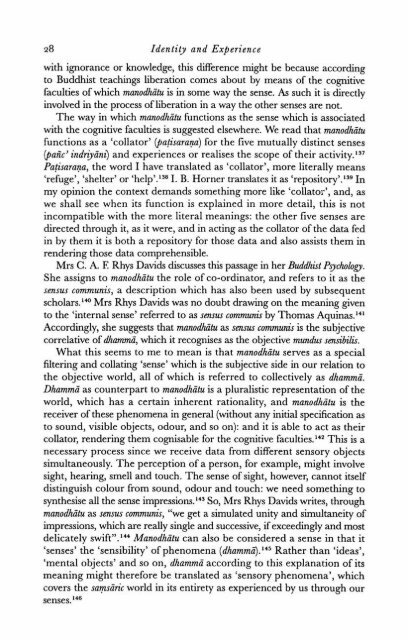Identity and Experience_Hamilton_1996
Identity and Experience_Hamilton_1996
Identity and Experience_Hamilton_1996
Create successful ePaper yourself
Turn your PDF publications into a flip-book with our unique Google optimized e-Paper software.
28 <strong>Identity</strong> <strong>and</strong> <strong>Experience</strong><br />
with ignorance or knowledge, this difference might be because according<br />
to Buddhist teachings liberation comes about by means of the cognitive<br />
faculties of which manodliitu is in some way the sense. As such it is directly<br />
involved in the process of liberation in a way the other senses are not.<br />
The way in which manodhiitu functions as the sense which is associated<br />
with the cognitive faculties is suggested elsewhere. We read that manodhiitu<br />
functions as a 'collator' (patisarana) for the five mutually distinct senses<br />
(pafic' indrzyiinz) <strong>and</strong> experiences or realises the scope of their activity.ls7<br />
Patisarana, the word I have translated as 'collator', more literally means<br />
'refuge', 'shelter' or 'help'.138 I. B. Horner translates it as 'repository'.13g In<br />
my opinion the context dem<strong>and</strong>s something more like 'collator', <strong>and</strong>, as<br />
we shall see when its function is explained in more detail, this is not<br />
incompatible with the more literal meanings: the other five senses are<br />
directed through it, as it were, <strong>and</strong> in acting as the collator of the data fed<br />
in by them it is both a repository for those data <strong>and</strong> also assists them in<br />
rendering those data comprehensible.<br />
Mrs C. A. E Rhys Davids discusses this passage in her Buddhist P~chology.<br />
She assigns to manodhiitu the role of co-ordinator, <strong>and</strong> refers to it as the<br />
sensus communis, a description which has also been used by subsequent<br />
scholars.lq Mrs Rhys Davids was no doubt drawing on the meaning given<br />
to the 'internal sense' referred to as sensus communis by Thomas Aquinas.I4l<br />
Accordingly, she suggests that manodhztu as sensus communis is the subjective<br />
correlative of dhammii, which it recognises as the objective mundus sensibilis.<br />
What this seems to me to mean is that manodhiitu serves as a special<br />
filtering <strong>and</strong> collating 'sense' which is the subjective side in our relation to<br />
the objective world, all of which is referred to collectively as dhammii.<br />
Dhamma as counterpart to manodhiitu is a pluralistic representation of the<br />
world, which has a certain inherent rationality, <strong>and</strong> manodhztu is the<br />
receiver of these phenomena in general (without any initial specification as<br />
to sound, visible objects, odour, <strong>and</strong> so on): <strong>and</strong> it is able to act as their<br />
collator, rendering them cognisable for the cognitive faculties. 14= This is a<br />
necessary process since we receive data from different sensory objects<br />
simultaneously. The perception of a person, for example, might involve<br />
sight, hearing, smell <strong>and</strong> touch. The sense of sight, however, cannot itself<br />
distinguish colour from sound, odour <strong>and</strong> touch: we need something to<br />
synthesise all the sense impressions.143 So, Mrs Rhys Davids writes, through<br />
manodhiitu as sensus communis, "we get a simulated unity <strong>and</strong> simultaneity of<br />
impressions, which are really single <strong>and</strong> successive, if exceedingly <strong>and</strong> most<br />
delicately swift".144 Manodhiitu can also be considered a sense in that it<br />
'senses' the 'sensibility' of phenomena (dhammq. 14= Rather than 'ideas',<br />
'mental objects' <strong>and</strong> so on, dhammi according to this explanation of its<br />
meaning might therefore be translated as 'sensory phenomena', which<br />
covers the sa?psiin'c world in its entirety as experienced by us through our<br />
senses. 146


